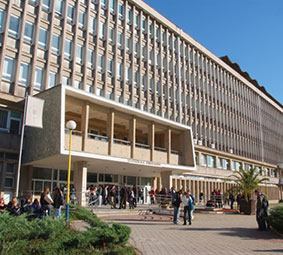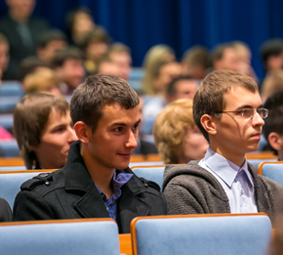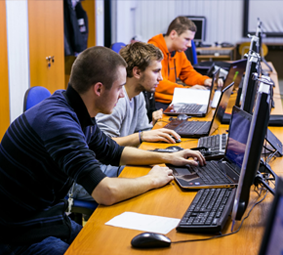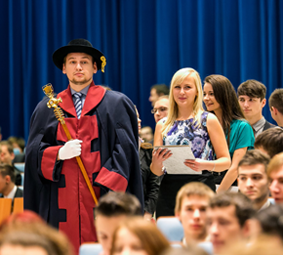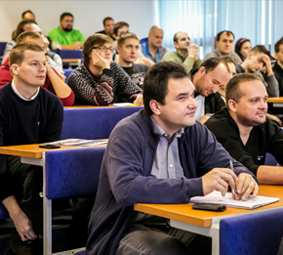Projects
| Project name | Project description |
|---|---|
| Semantic Modeling of Component-Based Program Systems |
The main goal of this project is to investigate the construction and behavior of component-based systems to ensure their reliability and desired behavior. To ensure the reliable execution of a complex program system composed of components, not only its static construction but also its dynamic behavior plays an important role. Thus the meaning of the basic concepts has to be precisely understood and rigorous rules have to be followed. However, while the construction of component-based program systems is well described in various publications with respect to practical aspects for working programmers, only a few publications define the construction of component-based systems formally. This research is based on the expertise of the Slovak partner on the categorical semantics of programs, on the expertise of the Austrian partner on logical system modeling and analysis, and on the fruitful cooperation of both partners in a previous collaboration project. |
| Setting the trends in IoT education |
This project addresses the development of skills involving the emerging Internet of Things (IoT) (also known as Industry 4.0)
technologies. The main focus falls on training, teaching and learning activities that better prepare the future IoT educators and
instructors at the vocational and higher educational levels, and also indirectly, the users/developers/entrepreneurs/innovators that
will shape the future of IoT. The project focuses on the development of core educational materials and of an open online community
to consume, share, review and enhance these materials. This will ensure a dynamic IoT educational platform where persons
interested in this field will interact directly.
|
| Manufacturing Industry Digital Innovation Hubs |
MIDIH "Manufacturing Industry Digital Innovation Hubs", is a "one stop shop" of services, providing industry with access to the most advanced digital solutions, the most advanced industrial experiments, pools of human and industrial competencies and access to "ICT for Manufacturing" market and financial opportunities. MIDIHs will leverage networks of local Competence Centres, each specialised in peculiar aspects of the CPPS/IIOT (Cyber Physical Production System / Industrial Internet of Things) technologies and able to attract, mentor and nurture local Manufacturing SMEs towards Industry 4.0 projects, experiments and business. A common platform of knowledge, methods and collaboration tools will be shared among the MIDIHs network and allow cross-border fertilisation, continuous improvement, open innovation. |
| Návrh a vývoj verifikovateľnej BDI architektúry pre IDS s využitím komponentových systémov a systémov virtuálnej reality |
V súčasnej informačnej spoločnosti je počítačová bezpečnosť nesporne veľmi aktuálnou oblasťou výskumu. V tejto oblasti musí byť obzvlášť kladený dôraz na návrh a vývoj spoľahlivých a bezpečných programových systémov. Jednou z možností ich vývoja je využitie komponentových systémov. V tomto projekte rozšírime pasívnu rolu IDS na aktívnu (t.j. automatizované reakcie systému na detegované sieťové narušenie). Na to využijeme inteligentnú BDI architektúru, ktorú navrhneme pre naše účely. Pri návrhu takejto architektúry musí byť obzvlášť kladený dôraz na jej korektnosť a spoľahlivosť. To bude zaručené využitím vhodných verifikačných formálnych metód. Navrhnutú architektúru implementujeme ako komponentový systém, kde jednotlivé komponenty budú predstavovať funkčné jednotky BDI architektúry. Ďalším cieľom bude vytvorenie vhodného používateľského rozhrania prostredníctvom systémov virtuálnej reality kvôli empirickému overovaniu práce s navrhnutým systémom.
|
| Enhancing cognition and motor rehabilitation using mixed reality |
Technological advancements based on mixed reality (MR) offer various challenges for research and medical treatment. The project focuses on two objectives related to healthy subjects and hemiparetic patients after stroke. First, we will test the hypothesis whether cognitive training using appropriately designed MR environment will enhance perceptual and cognitive performance in healthy subjects. This will be tested by computerized psychological experiments as well as by measuring event-related potentials or ERPs. Second, we will test the hypothesis whether experience with training in MR (in combination with motor-imagery based brain-computer interface developed by us) will enhance oscillatory sensory-motor rhythms. This will be tested by measuring subject’s EEG activity before and after each training session, clinical testing, as well as by the questionnaires aiming to learn about human factors including mental fatigue, motivation, irritation or sleepiness due to training. In both objectives, we will design and implement a set of testing procedures, carry out a battery of dedicated experiments, and critically evaluate the results with the goal to validate MR designs. |
| Intelligent Dynamic Spectrum Access Management for the Future Cognitive Communication Networks |
Hlavná technologická výzva sprevádzaná 5. generáciu mobilných komunikačných systémov je efektívne využitie dostupného frekvenčného spektra. Statické prideľovania frekvenčného spektra sa javí ako nedostatočné a jedno z možných riešení tohto problému je dynamické prideľovanie spektra pri použití technológie kognitívneho rádia. Technológia kognitívneho rádia je v súčasnosti mimoriadne diskutovaná oblasť, v ktorej sa otvára celé spektrum vyšetrovaných tém. Dynamické pridelovanie spektra je možné považovat za jednu z najvýznamnejších. Za základne funkčné bloky kognitívneho rádia je možné označiť blok monitorovania spektra, blok distribúcie a zdieľania spektra a nakoniec ekonomický blok distribúcie spektra. Súčasný stav poznania v oblasti dynamického prideľovania spektra sa výrazne limituje na analýzu vyšetrovania prevádzkových vlastností jednotlivých blokov, avšak ich vzájomná optimalizácia v dôsledku vysokej komplexity kognitívnej rádiovej siete je často obchádzaná. S cieľom riešiť tento problém, bude projekt IDR-KKS zameraný na vzájomnú optimalizáciu prevádzkových parametrov monitorovania a zdieľania spektra a ich dopad na navrhnuté ekonomické modely uvažovaných bezdrôtových štandardov 5G. Za účelom zachytenia vysokej dynamiky kognitívnej rádiovej siete, budeme v rámci projektu IDR-KKS uvažovať agentový prístup k modelovaniu a simulácií, ktorý sa ukázal ako veľmi efektívny v iných vedných odboroch (fyzika, ekonómia). Efektívnosť navrhnutých agentových modelov bude verifikovaná podľa vhodne zvolených scenárov. V rámci projektu IDR-KKS bude tiež realizovaná experimentálna kognitívna rádiová sieť umožňujúca verifikovať agentové modely aj v reálnej prevádzke. |
| Implementation of Modern Methods and Education Forms in the Area of Security of Information and Communication Technologies towards Requirements of Labour Market |
The increasing development of information society and its globalization is growing proportionally with the need to appropriately secure information and communication technologies. In this context, in the area of computer security there is an increasing demand for highly qualified professionals, where the current demand exceeds the offers of the labor market. Such a disproportion exerts high requirements on education in the area of security of particular university study programs. In order to successfully handle such a task, it is necessary to consider specialized university courses within the educational process along with an arising need for a close relation between particular courses of the study program. It may be expected that the deepening of the mutual relation between Informatics courses and the computer and software engineering, regarding security issues of the ICT (Information and Communication Technologies), will result in the increased quality of student preparation of the Informatics program. This is why the strategic goal of this project is to search for new methods, forms and technologies to transfer knowledge from the area of security to courses of the other study programs, using a suitable platform towards strategic requirements of the labor market. The solution will be implemented regarding the main goals, namely the innovation of the study Informatics program at the DCCI FEEI TUKE towards the issues of the ICT security, technical ensuring of the new education form in selected courses, and the creation of guides and examples for a practical application of the security knowledge towards the other courses. Students will be able to implement pragmatic project tasks, defined by the corresponding course, with a practical usethe result. As expected by the research team, this will have a positive impact on the quality of the education in the Informatics study program. |
| ViLMA: Virtual Laboratory for Malware Analysis |
The project aims to provide an innovative learning environment for computer security and research in the field of malicious software. Students will address the issue of malicious software at different levels, such as operating systems, computer networks, programming and reverse engineering. Innovative learning environment is based on a separate virtual platform, with the possibility of experimentation and examination of any attacks and threats without restrictions. Laboratory tools and resources allow students practical familiarity with the current trends in computer security and malicious software detection. |
| Focusing Education on Composability, Comprehensibility and Correctness of Working Software |
The main objective of the project is to train educators from selected universities (e.g. partners are training other partners in this project) in the field of functional programming (FP) and closely related areas of informatics that this trained university staff then will contribute to the increasing of the level of education at their home university. Partners train other partners in selected area of FP by sharing their research results and using their (specific) teaching experience and methods. We expect novel knowledge to be taught in all theoretical levels. |
| Update of computer networks curricula based on needs of practice |
The objective of this project is to update computer networks curricula at three Slovak technical Universities based on actual needs of practice. A dynamic development in the fields of network technologies and updated needs of industrial certification require a change of the content scope of lecturing and practical trainings. The secondary goal of this project is to create a cooperation platform among FIIT STU, FRI UNIZA, and FEI TUKE for exchanging content bases, knowledge, pedagogues, and students by means of common courses, summer schools, and practically oriented seminars and trainings. The achievement of this project and cooperation is a higher quality product -student with a high level of proficiency, better prepared for practice. The mutual exchanging of pedagogues and PhD students will support mutual ties and will reinforce the possibilities of the future scientific and pedagogical cooperation. This project will establish a new shared educational content for university students, implement into the education new items of multimedia content, collaborative tools and it will improve practical trainings as a precondition of better preparation of graduates for practice. |

